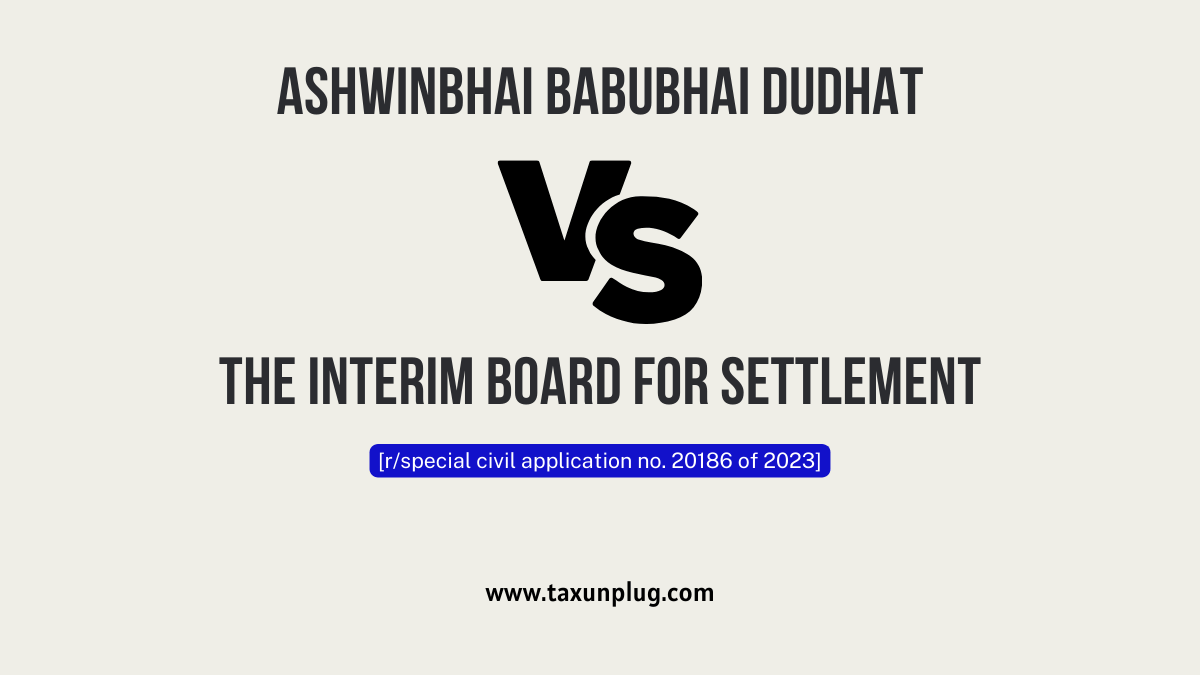Ashwinbhai babubhai dudhat vs The interim board for settlement [r/special civil application no. 20186 of 2023]
The petitioner was subjected to search proceedings by the Income Tax Authority under Section 132 of the Act on 06.03.2018. During search proceedings, various incriminating material and documents were found and seized and proceedings for assessment under Section153A of the Act commenced.
The petitioner thereafter filed an application before the Interim Board of Settlement Commission (IBS) on 27.12.2019 for the period from A.Y. 2011-12 to A.Y. 2018-19 disclosing the total income of INR 2,99,15,288/-. The petitioner in the said application stated that the undisclosed income was earned by carrying out transactions for buying and selling of land. The petitioner also declared unaccounted investment in construction of a bungalow out of unaccounted sale proceeds for sale of properties.
The IBS processed the application filed by the petitioner by passing an order under Section 245D(1) of the Act on 09.01.2020 and passed another order under Section 245D(2C) of the Act on19.02.2020.
Aggrieved, the petitioner filed an appeal against said impugned order.
The petitioner’s main arguments were centered around the assertion that the refusal of the exemption is contrary to the provisions of Section 54. They argued that since the cash receipts were declared as part of the undisclosed income during the settlement process, they should be eligible for the exemption benefits under Section 54.
The petitioner’s counsel further contended that the exemption provisions do not require the cash receipts to be disclosed in the original income tax return, and that the Board’s decision is based on an incorrect interpretation of the law, supported by the Act’s provisions. They also referred to legal precedents and the specific provisions of Section 245D(4) to argue that the Board’s decision should be in conformity with the law and not arbitrary.
On the other hand, the departmental representative argued that the conditions for the exemption under Section 54 had not been satisfied, pointing out that there was no disclosure of the cash receipts in the original income tax return and that the funds were not deposited into the Capital Gains Accounts Scheme as required.
The Interim Board for Settlement Commission also highlighted discrepancies in the petitioner’s disclosures and transactions, based on materials seized during the proceedings, and asserts its statutory authority to make decisions in accordance with the Income Tax Act.
The Hon’ble High Court of Gujarat examined whether the Board’s decision was contrary to the provisions of the Income Tax Act and further held that the petitioner is entitled to Section 54 benefits for the cash portion invested in the new property, as the denial was not based on valid grounds; where the Board’s decision is at odds with the Income Tax Act, taking into account the legal principles that allow for judicial review in cases where there are errors of law or deficiencies in the decision-making process.
In conclusion, the court supported the petitioner’s claim for deduction under Section 54 of the Income Tax Act, emphasizing compliance with statutory provisions and correct interpretation of the law. The case showcased the importance of procedural fairness and adherence to statutory requirements in tax settlement proceedings.
The appellant was thereby entitled to the deduction if the cash payment for property purchase is considered undisclosed income. The Settlement Commission’s order on the denial of deduction is quashed and set aside, and the order is modified to accept the amount offered by the petitioner as taxable long-term capital gains. The rule is made absolute to the extent of this modification, and no order regarding costs is made.
Ashwinbhai babubhai dudhat vs The interim board for settlement
To download official order, click here.“The site is for information purposes only and does not provide legal advice of any sort. Viewing this site, receipt of information contained on this site, or the transmission of information from or to this site does not constitute an attorney-client relationship. The information on this site is not intended to be a substitute for professional advice.”

